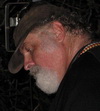| « Wanna Play Fund Donates to Music School | Music Educators Welcome at the 2011 NAMM Show » |
Serendipity Is In the Pocket
Mistakes can be the stuff that dreams are made of. A chance encounter in the night, an accidental phone call to the wrong person who turns out to be Mr. Right, call it serendipity. Serendipity is defined as “good luck in making unexpected and fortunate discoveries.” Another good word is synchronicity. Synchronicity is defined as “the experience of two or more events that are apparently unrelated, occurring together in a meaningful manner.” As musicians we need to constantly keep ourselves open to serendipity and aware of synchronicity.
Jazz musicians are quite possibly the most prolific at doing this. In jazz, you are probably never going to go on stage two nights in a row and play the same song, precisely the same way. Ideally, every player in the group is listening to everyone else, hearing what they are doing and anticipating where they are going to go. When it doesn’t happen, it may not be a train wreck, but it ain’t working. When it does work, those cats like to say that the group is “in the pocket.” In the pocket is a warm and fuzzy place where all of the sounds are together and working in the same groove. Once you’ve been on stage and felt it, it is an experience that you’ll never forget.
The recording studio is also a place where happy accidents are very prone to happen. Louis Armstrong, Satchmo, is widely credited with originating “Scat” singing. He didn’t, but here’s the real story of how he popularized it and got the reputation for inventing it. In 1926, Armstrong played a studio date on a song called, “Heebie Jeebies.” This is the record where he is said to have introduced “Scat Singing,” but he didn’t go into the studio with that plan.
Recording time was very expensive in the 1920s and you almost never heard the producer say “Take 2.” As they were performing the song, the sheet music slipped out of Louis’s hand and fell on the floor. He glanced through the control-room glass, where the recording lathe was and sitting with the engineer was the president of OKeh Race Records. This guy starts waving at Louis, indicating go ahead, keep on going. Back in New Orleans, in earlier years, musicians used to hum like an instrument, so Louis replaced the lyrics, which he didn’t know and couldn’t reach down to pick up, by humming like a cornet and that’s where “Scat Singing” is reputed to have been born. Louis turned a mistake into a new way of performing. It became so popular people would greet each other on the street corner with a “Scat,” I guess in the same style that some idiots approach you with today, loudly declaring, “Whassssup?”
Which, maybe, is not such a bad thing. Whoever stumbled upon that phrase/word(?) created the heart of a several hundred-million-dollar ad campaign. Let’s do one more word: Epiphany. The definition of epiphany is, “the sudden realization or comprehension of the larger essence or meaning of something.” So it would logically follow that when you have a serendipitous experience and sense its synchronicity with what you are doing, then you can understand the epiphanies of applying it to your music. Thank goodness when we open ourselves to opportunities we don’t need to think about definitions, otherwise Louis would still be trying to record “Heebie Jeebies.”
Always maintain situational awareness. Keep your mind open, do not close it. If someone has a suggestion, listen to them and then decide if you like the idea. A friend of mine, her name is Angie, came over to my studio one day and she started playing with the graphic equalizer on Media Player. I hadn’t noticed this and when I glanced down at it, I started to chuckle. She had one fader pushed all the way up and the one right next to it pulled all the way down. That’s ridiculous, I told her. I’m an old-school EQ guy, I know that the best pattern on a graphic EQ is a “happy face” with the faders, gently changing the levels on adjacent frequencies. I don’t want to date myself but this gem of information - that EQ can induce massive phase cancellation problems - comes from when we mastered everything to a disk. Well, we don’t master to disks anymore and when she pushed play it sounded great. So much for my old-school knowledge. I would never have tried it that way because I “knew” that it would not work.
You want to constantly be receptive to trying new avenues, to investigating inspirations, to discovering that epiphany. But also always keep your goal in mind. Clearly define what you want to achieve. Here’s one more story for you, then it’s bedtime. Ray Charles was once asked how many tracks he used for a song, and he replied, “I don’t care if you use 70 tracks, or one track… how does it SOUND?” I just know that it must be a rainy night in Georgia.
1 comment
| 5 star: | (1) | |
|---|---|---|
| 4 star: | (0) | |
| 3 star: | (0) | |
| 2 star: | (0) | |
| 1 star: | (0) | |
*****(5.0)
Love every bit that was written& yes I remember that day- Just love good music and good friends. : )






